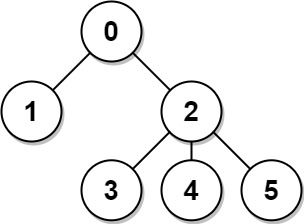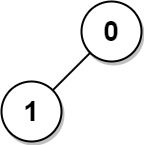Welcome to Subscribe On Youtube
834. Sum of Distances in Tree
Description
There is an undirected connected tree with n nodes labeled from 0 to n - 1 and n - 1 edges.
You are given the integer n and the array edges where edges[i] = [ai, bi] indicates that there is an edge between nodes ai and bi in the tree.
Return an array answer of length n where answer[i] is the sum of the distances between the ith node in the tree and all other nodes.
Example 1:

Input: n = 6, edges = [[0,1],[0,2],[2,3],[2,4],[2,5]] Output: [8,12,6,10,10,10] Explanation: The tree is shown above. We can see that dist(0,1) + dist(0,2) + dist(0,3) + dist(0,4) + dist(0,5) equals 1 + 1 + 2 + 2 + 2 = 8. Hence, answer[0] = 8, and so on.
Example 2:

Input: n = 1, edges = [] Output: [0]
Example 3:

Input: n = 2, edges = [[1,0]] Output: [1,1]
Constraints:
1 <= n <= 3 * 104edges.length == n - 1edges[i].length == 20 <= ai, bi < nai != bi- The given input represents a valid tree.
Solutions
-
class Solution { private int n; private int[] ans; private int[] size; private List<Integer>[] g; public int[] sumOfDistancesInTree(int n, int[][] edges) { this.n = n; g = new List[n]; ans = new int[n]; size = new int[n]; Arrays.setAll(g, k -> new ArrayList<>()); for (var e : edges) { int a = e[0], b = e[1]; g[a].add(b); g[b].add(a); } dfs1(0, -1, 0); dfs2(0, -1, ans[0]); return ans; } private void dfs1(int i, int fa, int d) { ans[0] += d; size[i] = 1; for (int j : g[i]) { if (j != fa) { dfs1(j, i, d + 1); size[i] += size[j]; } } } private void dfs2(int i, int fa, int t) { ans[i] = t; for (int j : g[i]) { if (j != fa) { dfs2(j, i, t - size[j] + n - size[j]); } } } } -
class Solution { public: vector<int> sumOfDistancesInTree(int n, vector<vector<int>>& edges) { vector<vector<int>> g(n); for (auto& e : edges) { int a = e[0], b = e[1]; g[a].push_back(b); g[b].push_back(a); } vector<int> ans(n); vector<int> size(n); function<void(int, int, int)> dfs1 = [&](int i, int fa, int d) { ans[0] += d; size[i] = 1; for (int& j : g[i]) { if (j != fa) { dfs1(j, i, d + 1); size[i] += size[j]; } } }; function<void(int, int, int)> dfs2 = [&](int i, int fa, int t) { ans[i] = t; for (int& j : g[i]) { if (j != fa) { dfs2(j, i, t - size[j] + n - size[j]); } } }; dfs1(0, -1, 0); dfs2(0, -1, ans[0]); return ans; } }; -
class Solution: def sumOfDistancesInTree(self, n: int, edges: List[List[int]]) -> List[int]: def dfs1(i: int, fa: int, d: int): ans[0] += d size[i] = 1 for j in g[i]: if j != fa: dfs1(j, i, d + 1) size[i] += size[j] def dfs2(i: int, fa: int, t: int): ans[i] = t for j in g[i]: if j != fa: dfs2(j, i, t - size[j] + n - size[j]) g = defaultdict(list) for a, b in edges: g[a].append(b) g[b].append(a) ans = [0] * n size = [0] * n dfs1(0, -1, 0) dfs2(0, -1, ans[0]) return ans -
func sumOfDistancesInTree(n int, edges [][]int) []int { g := make([][]int, n) for _, e := range edges { a, b := e[0], e[1] g[a] = append(g[a], b) g[b] = append(g[b], a) } ans := make([]int, n) size := make([]int, n) var dfs1 func(i, fa, d int) dfs1 = func(i, fa, d int) { ans[0] += d size[i] = 1 for _, j := range g[i] { if j != fa { dfs1(j, i, d+1) size[i] += size[j] } } } var dfs2 func(i, fa, t int) dfs2 = func(i, fa, t int) { ans[i] = t for _, j := range g[i] { if j != fa { dfs2(j, i, t-size[j]+n-size[j]) } } } dfs1(0, -1, 0) dfs2(0, -1, ans[0]) return ans } -
function sumOfDistancesInTree(n: number, edges: number[][]): number[] { const g: number[][] = Array.from({ length: n }, () => []); for (const [a, b] of edges) { g[a].push(b); g[b].push(a); } const ans: number[] = new Array(n).fill(0); const size: number[] = new Array(n).fill(0); const dfs1 = (i: number, fa: number, d: number) => { ans[0] += d; size[i] = 1; for (const j of g[i]) { if (j !== fa) { dfs1(j, i, d + 1); size[i] += size[j]; } } }; const dfs2 = (i: number, fa: number, t: number) => { ans[i] = t; for (const j of g[i]) { if (j !== fa) { dfs2(j, i, t - size[j] + n - size[j]); } } }; dfs1(0, -1, 0); dfs2(0, -1, ans[0]); return ans; }